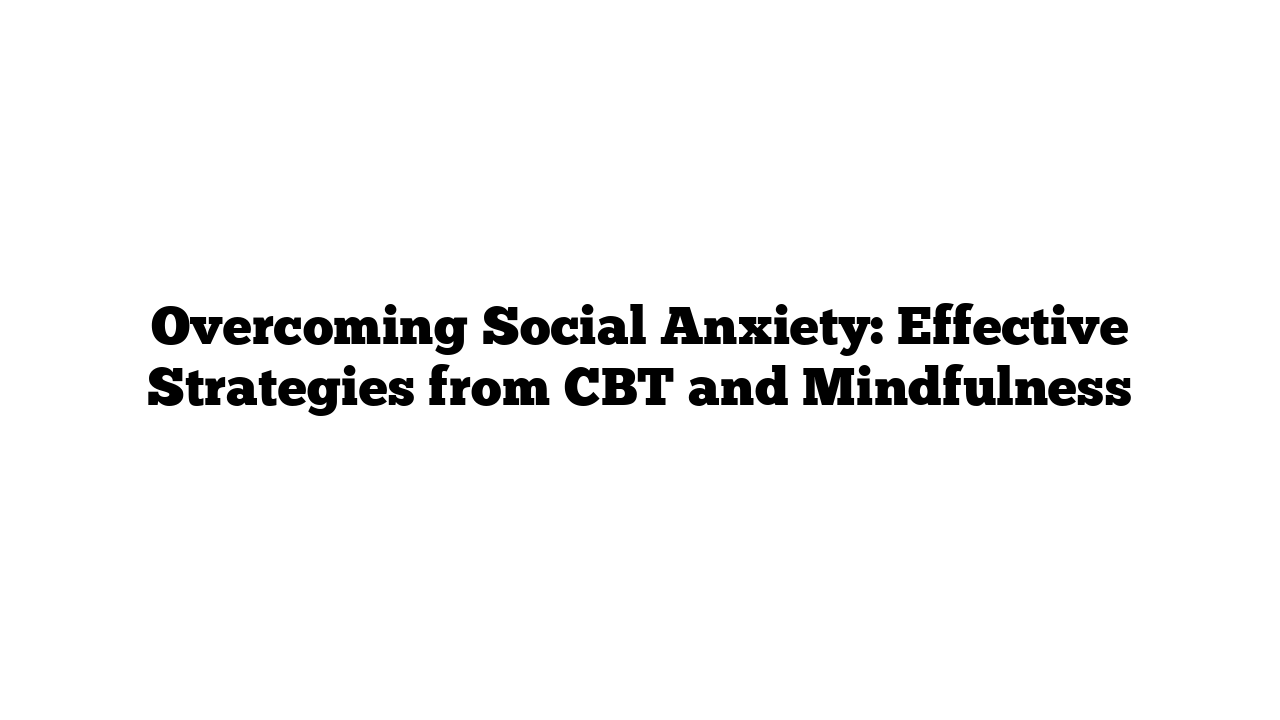Do you often feel anxious in social situations? Perhaps you experience shyness, nervousness, or even a sense of dread that drives you to avoid social gatherings altogether. Social anxiety is something many people encounter at various points in their lives, and it can make interactions with others feel overwhelming. In this article, we’ll explore simple yet powerful strategies from Cognitive Behavioral Therapy (CBT) and mindfulness that can help you break free from the grips of social anxiety.
Understanding Social Anxiety
Social anxiety can show up in many ways. For some, it may be a mild discomfort in social settings. For others, it can feel like a paralyzing fear of being judged or embarrassed. As a healthcare professional, I see many patients who express concerns about their ability to engage in social situations without feeling anxious.
Almost everyone experiences some level of social anxiety, particularly when facing unfamiliar environments or new people. It’s important to recognize that you’re not alone in this experience.
The Role of Exposure in Reducing Anxiety
One of the most effective treatments for overcoming social anxiety is exposure therapy. This approach involves gradually putting yourself in social situations that trigger your anxiety. By doing this, you can learn that these environments aren’t as threatening as you might fear.
For instance, let’s say you receive an invitation to a social event where you don’t know many people. Your first reaction might be to decline the invitation to avoid the anxiety. However, if you constantly avoid these situations, you limit your social life and reinforce your anxiety.
Instead, consider approaching the event as an opportunity for learning. Before you attend, ask yourself the following questions:
- What do I expect will happen at this event?
- What am I most worried about?
- What feelings am I afraid I won’t be able to tolerate?
This reflection can help clarify your thoughts. When you eventually attend the gathering, take note of what happens. Did your predictions hold true? Often, you might find that people are friendlier than you expected. Even if you felt awkward, you were still able to hold conversations!
Modifying Your Thoughts
Alongside exposure therapy, it’s essential to modify negative thoughts that contribute to your anxiety. Instead of telling yourself, “I will embarrass myself,” try reframing it to something more positive, like, “People are generally friendly, and it’s perfectly okay to be a bit awkward.”
This cognitive restructuring can help lower your anxiety before and during social situations. You can even practice this thought adjustment in real time when you’re engaging with others. Remember: It’s okay to feel nervous.
Mindfulness Techniques for Managing Emotions
Mindfulness is about staying present and accepting your thoughts and feelings without judgment. If you begin to feel anxious, acknowledge that feeling: “It’s okay to feel this way.” Understanding that anxiety is a temporary emotional state can empower you to engage with others despite feeling uneasy.
As you interact in social situations, focus on the conversation and let your anxiety fade into the background. By practicing mindfulness regularly, you can build resilience against social anxiety and improve your overall emotional well-being.
Keep Practicing for Success
Overcoming social anxiety isn’t a one-time event; it’s a journey that involves consistent practice and patience. Remember, exposure to social situations, reframing negative thoughts, and practicing mindfulness are essential tools in your toolkit.
As the saying goes, “Practice makes perfect.” The more you expose yourself to social interactions, the more comfortable you will become. If you want to learn more about managing social anxiety and other related topics, visit medicaltimes.io for more informative articles.
Further Reading
For additional insights into social anxiety and strategies to manage it, check out these resources:
- Anxiety and Depression Association of America
- American Psychological Association: Social Anxiety Disorder
- Verywell Mind: Understanding Social Anxiety
Arming yourself with knowledge and practical strategies can make all the difference. Remember, it’s okay to feel anxious at times; what matters is how you choose to respond!
